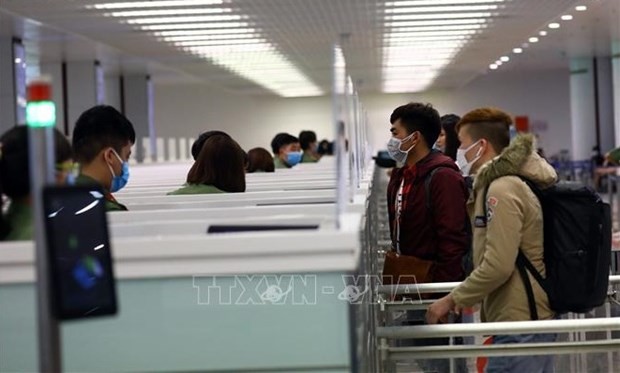
All e-visa procedures carried out online: Immigration Department
Latest
 |
| The Government has decided to grant e-visas to citizens of all countries and territories. (Photo: VNA) |
The entire process for granting e-visas, from applying for, processing requests to issuing visas and paying fees, is now carried out online, said the Vietnam Immigration Department of the Ministry of Public Security.
On August 14, the Government issued Resolution 127/NQ-CP, deciding to grant e-visas to citizens of all countries and territories.
According to the department, foreigners who plan to enter Vietnam to travel, conduct market surveys, or explore investment chances, among others, can apply for e-visas by themselves without the need for invitations or guarantees from Vietnamese agencies, organisations, or individuals.
All the procedures from applying for, processing requests to providing e-visas and paying fees are carried out online. Foreigners can print visas by themselves and don’t have to handle visa reception procedures at visa granting agencies of Vietnam abroad, at international ports of entry, or via intermediaries, it said.
The department added that it will consider, process, and reply to e-visa applicants via the public service portal of the Ministry of Public Security within three working days since the day it receives sufficient e-visa application information and fees.
According to the Government’s decision, foreigners using e-visas are permitted to enter or exit Vietnam via 13 air border gates, 16 land border gates, and 13 sea border gates.
The 13 air border gates consist of Noi Bai (Hanoi), Tan Son Nhat (Ho Chi Minh City), Cam Ranh (Khanh Hoa province), Da Nang (Da Nang city), Cat Bi (Hai Phong city), Can Tho (Can Tho city), Phu Quoc (Kien Giang province), Phu Bai (Thua Thien-Hue), Van Don (Quang Ninh province), Tho Xuan (Thanh Hoa province), Dong Hoi (Quang Binh province), Phu Cat (Binh Dinh province), and Lien Khuong (Lam Dong province).
The 16 land border gates are Tay Trang (Dien Bien province), Mong Cai (Quang Ninh province), Huu Nghi (Lang Son province), Lao Cai (Lao Cai province), Na Meo (Thanh Hoa province), Nam Can (Nghe An province), Cau Treo (Ha Tinh province), Cha Lo (Quang Binh province), La Lay and Lao Bao (Quang Tri province), Bo Y (Kon Tum province), Moc Bai and Xa Mat (Tay Ninh province), Vinh Xuong (An Giang province), and Ha Tien (Kien Giang province).
The 13 sea border gates comprise Hon Gai and Cam Pha (Quang Ninh province), Hai Phong (Hai Phong city), Nghi Son (Thanh Hoa province), Vung Ang (Ha Tinh province), Chan May (Thua Thien-Hue province), Da Nang (Da Nang city), Nha Trang (Khanh Hoa province), Quy Nhon (Binh Dinh province), Dung Quat (Quang Ngai province), Vung Tau (Ba Ria - Vung Tau province), Ho Chi Minh City, and Duong Dong (Kien Giang province).
The National Assembly approved the law amending and supplementing some articles of the Law on Exit and Entry of Vietnamese Citizens and the Law on Foreigners’ Entry into, Exit from, Transit through and Residence in Vietnam in late June.
Under this law, coming into force on August 15, the e-visa validity period is extended to 90 days from 30 days. Within 90 days after the e-visa is granted, foreigners can enter and exit Vietnam for unlimited times and without having to apply for new visas. The law also permits citizens of the countries entitled to Vietnam’s unilateral visa exemption to be granted a temporary residence period of 45 days, instead of 15 days in the past, and have visa granting and temporary residence extension considered in line with regulations.
The moves are expected to provide favourable conditions for Vietnam to attract international tourists and improve its tourism competitiveness compared to regional rivals.
The expansion of the coverage and extension of the validity period of e-visas for foreigners will help modernise administrative procedures and save time for applicants, the Immigration Department said.









